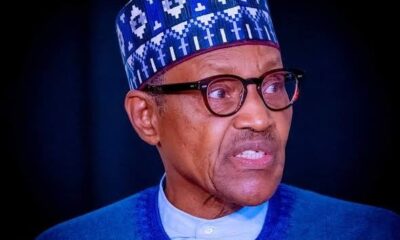Politics
Jordan’s Prime Minister Bisher Khasawneh Resigns After Parliamentary Elections Amid Gaza War Frustration
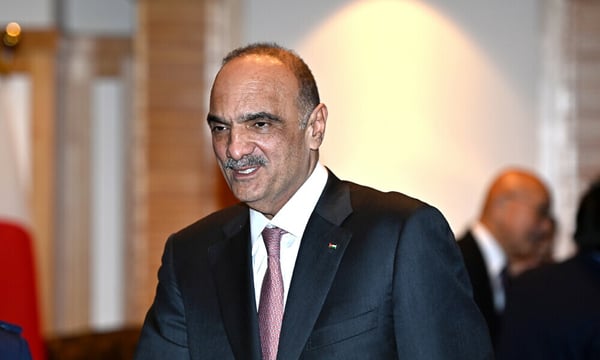
Jordan’s Prime Minister Bisher Khasawneh submitted his resignation to King Abdullah II on Sunday, following parliamentary elections dominated by public frustration over the Gaza war, State media reported.
The resignation is a constitutional tradition in Jordan, where the government typically steps down after legislative elections. The king appoints the prime minister, who will now form a new government.
Tuesday’s poll saw the Islamic Action Front (IAF), the country’s leading Islamist party, emerge as the largest bloc in parliament, winning 31 out of 138 seats. The IAF, a political offshoot of the Muslim Brotherhood, has secured its largest representation since 1989. Voter dissatisfaction with economic woes and Israel’s war against Hamas in Gaza drove the IAF’s success, despite a low turnout of 32%.
Jordan’s 1994 peace treaty with Israel has faced renewed scrutiny, with regular protests calling for its dissolution since the conflict erupted last Oc tober. Nearly half of Jordan’s population is of Palestinian origin, and the Gaza war has significantly impacted the country’s tourism sector, which accounts for 14% of its GDP.
Jordan relies heavily on foreign aid, particularly from the US and International Monetary Fund. The country faces significant economic challenges, with an unemployment rate of 21% in the first quarter of 2024. Khasawneh, 55, has led the government since October 2020. Jordan’s parliament is bicameral, comprising an elected parliament and a senate with 69 members appointed by the monarch.
The king will now appoint a new prime minister to form a government. The development comes at a critical time for Jordan, as it navigates regional tensions and domestic economic challenges. The appointment of a new government will be closely watched for its potential impact on the country’s future direction
Read Also
Democrats Unleash A New Era Of Sarcasm And Joy In Campaigning
Analysis
Buhari, Power and the Burden of Integrity, by Alabidun Shuaib AbdulRahman
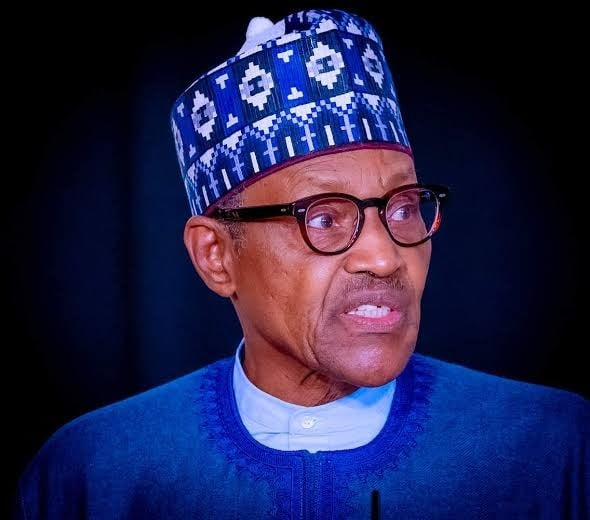
Buhari, Power and the Burden of Integrity, by Alabidun Shuaib AbdulRahman
Buhari’s life and leadership have always been defined by paradox. A man who began as a disciplined soldier, steeped in the rigors of military order, he later assumed the mantle of democratic president in a nation that demanded compromise, negotiation, and a delicate balance of interests. The launch of Muhammadu Buhari: From Soldier to Statesman, a biography by Dr. Charles Omole, provides a rare window into the inner workings of his leadership, tracing the contours of political power, family controversies, moral conviction, and the costs of integrity in office. What emerges is not a hagiography nor a critique, but a portrait of a man and a presidency struggling to reconcile principle with consequence, personal discipline with institutional responsibility.
Buhari’s political trajectory is remarkable for both its longevity and its historic impact. In 2015, he defeated the incumbent, President Goodluck Jonathan, winning 15.4 million votes to Jonathan’s 12.9 million. This was the first time an opposition candidate defeated a sitting president in Nigeria’s democratic history. He was re-elected in 2019 with 15.1 million votes, defeating Atiku Abubakar. These numbers reflect the scale of public confidence he inspired, a confidence rooted in a reputation for integrity and moral rectitude that transcended party lines. Yet the biography reveals that such trust came with enormous burdens, for voters expected not just policies, but a moral compass that could steer Nigeria through turbulent waters.
The book recounts Buhari’s tenure as military ruler from 1983 to 1985, underscoring the formative influence of that period on his understanding of leadership. As Head of State, he launched the “War Against Indiscipline” (WAI), a campaign to instill order in public life. Clean streets, punctuality, respect for authority were not cosmetic policies but reflections of his belief that moral and civic discipline were prerequisites for national progress. Yet, this strictness came at a cost: political opponents were detained without trial, the press faced censorship, and economic policies often exacerbated hardship. That era established a pattern that would recur in civilian rule: moral conviction in crisis with the human and institutional consequences of policy.
Fast forward to the Buhari presidency, and the book illustrates the complex interplay between his principles and governance. One illustrative episode is the controversial 2022 naira redesign. Ostensibly an economic measure to reduce inflation, curb cash hoarding, and encourage digital transactions, the policy had deep political and social ramifications. According to the biography, it was partially conceived to disrupt vote-buying ahead of the 2023 elections. While intended to advance the nation’s integrity, it triggered acute cash shortages, disrupted small businesses, and left rural communities struggling to access basic necessities. Millions of Nigerians were affected in an economy already reeling from two recessions: one in 2016, when GDP contracted by 1.6 percent following an oil price collapse, and another in 2020 due to the COVID-19 pandemic. Public debt ballooned from ₦12 trillion in 2015 to over ₦77 trillion by 2023, while inflation and unemployment rates soared, revealing the burden between moral intent and social impact.
Buhari’s handling of party politics also illuminates the burden of integrity. The biography recounts an incident during the All Progressives Congress (APC) 2022 primaries, when aides allegedly sought to influence outcomes by instructing security chiefs to favor a preferred candidate. Those instructions were not acted upon, and Buhari, upon learning of the attempt, refused to intervene, insisting he would not impose his choice. This decision, while morally consistent with democratic ideals, allowed internal factionalism to flourish and exposed the limitations of leadership built on principle rather than coercive control. It demonstrates a recurring theme in Buhari’s rule: the discipline of a soldier tested in the unpredictable theatre of democratic politics.
Family, too, emerges as a domain where power and integrity intersected with the controversy. The biography includes revelations from his wife, Aisha Buhari, describing a period during Buhari’s prolonged medical leave in 2017 in which rumours circulated suggesting she intended harm against him. However, the president’s response of locking his room and avoiding meals she prepared speaks to the psychological weight of leadership, where suspicion and trust coexist uneasily. Their daughter, Fatima Buhari, recounts discovering official documents bearing forged signatures of her father, raising questions about authenticity and control in the corridors of power. These episodes are not sensationalism for its own sake; they illustrate how integrity, both personal and institutional, can be compromised or distorted, even within the president’s immediate household.
Mamman Daura, Buhari’s influential nephew, occupies a particularly revealing space in the book. His proximity to the president has often been cited in discussions of the so-called “Villa cabal.” Omole presents this relationship not as a conspiratorial plot but as an instance of moral and personal trust shaping governance. Buhari, who valued loyalty and shared history, often delegated authority to individuals he believed would uphold his principles. Yet, as the biography notes, reliance on personal loyalty rather than institutional mechanisms introduced vulnerabilities, making the administration susceptible to both internal intrigue and public criticism.
On national security, the book offers both praise and critique. Under Buhari, Boko Haram, which had seized numerous local government areas in the Northeast, was territorially weakened. Multinational cooperation improved, and thousands of insurgents were neutralized. Yet the book notes that other security challenges intensified. Banditry in the Northwest claimed thousands of lives, and farmer-herder conflicts escalated in multiple regions. Buhari’s military instinct led him to approach these issues as security problems rather than socio-economic ones, projecting the limits of a morality-focused approach in a structurally complex nation.
Economic policy further illustrates the paradox of integrity under duress. Infrastructure projects, including rail lines, roads, and power facilities, were completed or accelerated. Social intervention programs were expanded. Yet inflation, unemployment, and poverty rates remained stubbornly high. For example, inflation reached double-digit levels in 2022, and the National Bureau of Statistics reported unemployment exceeding 33 percent in 2021. The book posits that Buhari’s commitment to ethical governance eschewing patronage and corruption sometimes conflicted with pragmatic economic interventions that could have alleviated immediate suffering, highlighting the burdens of integrity in office.
The biography also situates Buhari’s moral philosophy within the broader framework of public expectation. He was widely regarded as a man who rejected ostentation, faithfully declared his assets, and maintained a personal life detached from the trappings of power. Yet the book underscores a central question: Can personal virtue compensate for systemic dysfunction? Policies executed with moral clarity did not always produce equitable outcomes, reminding readers that integrity, however steadfast, does not insulate a society from consequence.
Public reception of the biography has mirrored the divided legacy it chronicles. Supporters emphasize Buhari’s unwavering commitment to principle, his efforts to curb corruption, and his steadfast leadership during challenging times. Critics focus on policy missteps, humanitarian fallout, and perceived aloofness. The biography itself has ignited debate over historical interpretation and the role of personal narrative in shaping public memory. Former Kaduna Governor Nasir el-Rufai described the book as potentially transforming Buhari’s legacy into a tool for narrow political interests, while analysts caution that literary accounts cannot fully capture the lived experiences of citizens affected by policy.
The book’s thematic core—power coupled with integrity—offers lessons not just about Buhari, but about governance itself. Leadership demands balancing moral conviction with the pragmatic complexities of a diverse nation. Buhari’s experience illustrates that personal integrity, while admirable, cannot operate in a vacuum. The mechanisms of state, the pressures of politics, and the unpredictability of human behavior inevitably shape outcomes in ways that moral intent alone cannot control. The biography does not shy away from these contradictions; it embraces them as part of the story.
Ultimately, From Soldier to Statesman positions Buhari as a figure whose public life cannot be divorced from private conviction. His military discipline, moral clarity, and personal austerity defined his approach to governance, even when structural realities and human behavior complicated the translation of those principles into policy. The narrative challenges readers to consider the burdens of integrity: the personal cost, the public expectation, and the unintended consequences that arise when principle meets the messy reality of nationhood. Nigeria, as much as Buhari himself, is the subject of this reflection.
In framing his legacy, the book refrains from offering final judgments. Instead, it presents evidence, testimony, and analysis, leaving readers to grapple with the complex interplay of power, family, and moral responsibility. It reminds us that leadership is seldom a matter of unalloyed success or failure. It is a negotiation between ideals and realities, between what a leader believes should happen and what the nation can sustain. Buhari’s story, as told in this biography, is emblematic of that tension, offering a prism through which to examine Nigeria’s own ongoing struggle with governance, morality, and the rule of law.
By revisiting Buhari through the lens of personal integrity and public consequence, the biography forces a recognition that moral leadership is not costless. Policies rooted in principle may impose hardship, familial loyalty may complicate governance, and the very discipline that preserves character may restrict flexibility. The book situates Buhari as a man aware of these burdens, striving to navigate them even when the outcomes were imperfect, sometimes harsh, but always reflective of a personal code of ethics that remained central to his identity.
In the final assessment, Muhammadu Buhari: From Soldier to Statesman is more than a recounting of elections, decrees, and family dynamics. It is an exploration of the paradoxes of leadership in Nigeria. Buhari’s life and presidency illuminate the dilemmas inherent in governing a nation of over 220 million people, the costs of maintaining integrity in office, and the consequences of holding principle above expediency. For students of politics, historians, and citizens alike, the book offers both a cautionary tale and a meditation on what it means to carry the weight of power with conscience as a guide. Buhari’s story, and Nigeria’s, are inseparable: a testament to the enduring tension between moral leadership and political reality, and a reflection on the burdens that accompany integrity at the highest level of governance.
Alabidun is a media practitioner and can be reached via alabidungoldenson@gmail.com
Analysis
Insecurity: Defence, Development, and Duty, by Alabidun Shuaib AbdulRahman
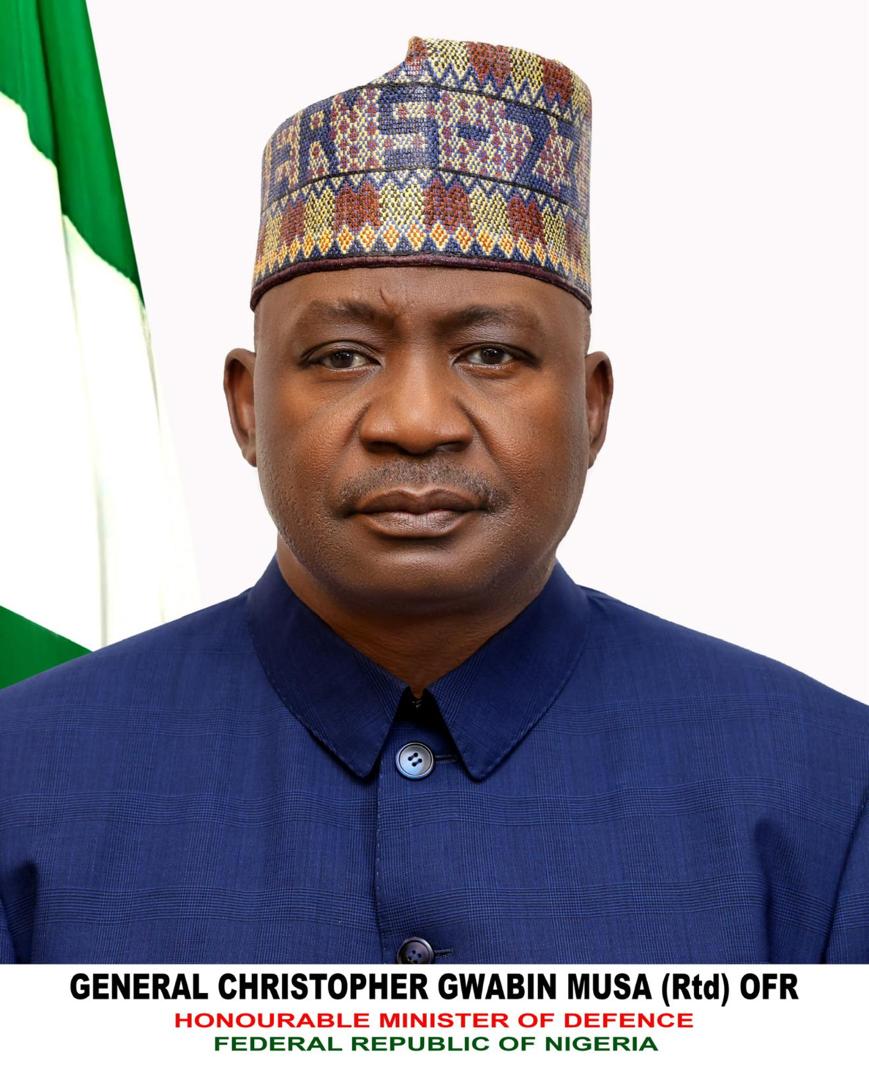
Insecurity: Defence, Development, and Duty, by Alabidun Shuaib AbdulRahman
Last week, this column examined the need for Nigeria to go beyond the symbolic appointment of a Defence Minister and to embrace a more strategic, coherent and results‑oriented national security policy. With the Honourable Minister of Defence, General Christopher Gabwin Musa (rtd) now sworn in and formally at his desk, the expectations of Nigerians have understandably risen. Citizens are no longer satisfied with promises that go unfulfilled, rhetoric without measurable results, or military engagements that deliver ephemeral victories without sustainable impact. The scale of the challenge is immense, and to effectively confront insecurity in all its dimensions requires a realistic blueprint that is rooted in global experience but fully adapted to our domestic realities.
The current insecurity landscape in Nigeria is not confined to a single theatre of operation. It encompasses violent extremism in the Northeast involving Boko Haram and Islamic State West Africa Province (ISWAP) factions; widespread banditry and cattle rustling across the Northwest; mass kidnappings for ransom that have spread into Central and Southern states; maritime piracy and sea robbery; farmers‑herders clashes in the Middle Belt; and criminal syndicates operating along transport corridors. These threats are not isolated, and they share common vectors that exploit governance gaps, economic deprivation, porous borders, and community distrust of state institutions. The sheer breadth of this insecurity crisis has made it clear that conventional, ad hoc responses will not suffice. What Nigeria requires now is a comprehensive, intelligence‑driven approach that integrates defence, internal security, economic development, and community empowerment.
The experience of other countries that have confronted similar threats offers instructive lessons. Nations that have made progress in countering terrorism and organised crime have done so by strengthening intelligence structures, integrating technology into security operations, building trust with local communities, and coordinating interagency responses. The United Kingdom’s counter‑terrorism framework, known as CONTEST, was first developed in 2003 by Sir David Omand at the Home Office in response to the 2001 9/11 attacks. It has been revised in 2006, 2009, 2011, 2018, and most recently in July 2023 to address evolving threats. CONTEST’s four pillars — Prevent, Pursue, Protect and Prepare — aim to safeguard UK citizens and infrastructure. Between 2018 and 2023, nine terrorist attacks were declared in the UK, resulting in six deaths and about 20 injuries, while law enforcement agencies disrupted 39 late-stage terrorist plots before they could be executed. The Counter-Terrorism and Security Act 2019, introduced by then Home Secretary Sajid Javid and receiving Royal Assent on 12 February 2019, further strengthened UK powers at ports, borders, and in counter‑terrorism investigations. These measures reiterate the importance of intelligence integration and pre-emptive action, lessons highly relevant to Nigeria’s own security planning.
Spain’s experience with ETA (Euskadi Ta Askatasuna) provides another instructive example. ETA was responsible for hundreds of deaths over decades before declaring a definitive cessation of armed activity in 2011 and formally dissolving its structure in May 2018. French and Spanish security cooperation played a decisive role in degrading ETA’s networks throughout the 2000s and 2010s, alongside judicial and intelligence reforms after the 2004 Madrid train bombings. Historical estimates attribute between 830 and 857 killings to ETA, illustrating both the human cost of insurgency and the impact of sustained counter-terrorism measures led by state intelligence agencies. Spain’s Ministry of Interior and Counter-Terrorism Intelligence Centre continues to coordinate post-ETA security strategies, reflecting the necessity of ongoing vigilance even after apparent victories.
Saudi Arabia has also demonstrated the impact of a coordinated, high-level counter-terrorism approach. In 2005, the Kingdom hosted the first International Counter-Terrorism Conference in Riyadh, attended by over 55 countries, resulting in the establishment of the United Nations Counter-Terrorism Centre (UNCCT) with Saudi financial support of US$110 million to assist countries in combating terrorism. Further, in February 2014, King Abdullah issued a royal decree reinforcing counter-terrorism measures, stating that participation in extremist or terrorist activities would not be tolerated, reflecting a strong political commitment to national and global security. According to the Global Terrorism Index, Saudi Arabia’s terrorism impact score declined significantly over the past decade, demonstrating the effectiveness of combined intelligence, legislative, and operational measures.
The Global Terrorism Index (GTI), published annually by the Institute for Economics and Peace, provides a reliable benchmark for assessing global terrorism trends. The 2025 GTI reported that 66 countries recorded terrorist attacks in 2024, up from 58 the previous year, indicating the persistent and shifting nature of the threat. The Sahel region accounted for more than half of global terrorism-related deaths, while lone-wolf and extremist-inspired attacks increased in Western countries. These data underline that counter-terrorism outcomes depend on sustained political will, integrated agency action, and community engagement, lessons, again, that are directly applicable to Nigeria.
In Nigeria, security responses have frequently been reactive. Major operations are mounted after attacks have occurred, rather than through proactive disruption of networks and early interdiction of planned activities. To shift this paradigm, the Defence Ministry under General Christopher Gabwin Musa must prioritise the establishment of a National Intelligence Fusion Centre. Such a centre would integrate data from the military, police, Department of State Services, National Security Adviser’s office, customs, immigration, and digital surveillance units into a single analytic platform. This would enable real-time situational awareness, more accurate threat forecasting, and faster decision-making. A national counter-terrorism database accessible to all relevant agencies, with robust legal protections for privacy and civil liberties, would serve as the cornerstone of this integrated architecture.
Border security is another area where strategic emphasis must be placed. Many militant and criminal groups operating in Nigeria exploit porous borders with neighbouring countries. These transnational linkages facilitate the movement of fighters, weapons, contraband, and illicit funds. The Economic Community of West African States (ECOWAS) has recognised this regional dynamic and proposed a 5,000-member standby force to respond rapidly to insecurity across member states at an estimated first-year cost of $2.61 billion. Nigeria must not only support and participate in regional frameworks but must also strengthen its own border control mechanisms. Smart border technologies such as biometric identification systems, integrated customs and immigration databases, and joint patrols with neighbouring states would make significant inroads into restricting unauthorised movements. Additionally, aerial and satellite surveillance over key migratory and smuggling corridors would enhance the country’s ability to detect and intercept threats before they materialise. Stronger border security disrupts the flow of armed groups, weapons, and contraband while protecting economic zones and encouraging lawful trade.
A critical deficiency in Nigeria’s current security approach has been the disconnect between national forces and local communities. In areas affected by violent extremism and banditry, many communities feel abandoned or marginalised. This creates fertile ground for violent actors to gain influence by positioning themselves as protectors or providers of services. The rise of community security networks such as the Civilian Joint Task Force in the Northeast and Amotekun in the Southwest offers a promising model for localised engagement. These groups have provided valuable situational insights, early warning reporting, and rapid response capabilities. But their informal status limits their effectiveness. What is needed is a nationally coordinated framework that formally integrates community security structures into the broader security architecture, with clear legal status, standardised training, dedicated resources, and oversight mechanisms that ensure accountability and respect for human rights. Empowered, community-embedded security actors can act as force multipliers, strengthening the reach of formal security agencies and building trust between citizens and the state.
Technology must be at the heart of Nigeria’s future security efforts. Modern conflicts are increasingly shaped by information, surveillance, and real-time connectivity. Drones, Intelligence Surveillance and Reconnaissance (ISR) platforms, secure communication networks, and artificial intelligence tools for pattern detection can transform the operational footprint of security agencies. For a country with vast territories that are difficult to monitor through ground forces alone, investing in long-endurance drones and satellite imagery agreements would provide crucial surveillance coverage. Integrating AI-enabled systems to analyse movement patterns, social media signals, and financial flows linked to criminal networks can alert authorities to emerging threats before they materialise into attacks. These investments should be accompanied by specialised training for personnel to interpret and act on the data generated by these systems. In this way, technology amplifies human capacity and creates a more agile, responsive defence posture.
Civil-military relations also demand urgent attention like never before. The pattern of military engagements that yield high collateral damage or disregard human rights has undermined public confidence. Nigeria’s military must adopt what is often referred to in strategic circles as a “hearts and minds” approach. This means that operations should be conducted with strict adherence to the rule of law, with proactive measures to minimise harm to civilians, and with structured engagement mechanisms that involve traditional leaders, local influencers, and civil society organisations.
Socio-economic development must be integrated into the security agenda. One of the principal drivers of recruitment into violent groups is the lack of opportunity for youth. Unemployment remains high, especially in regions most affected by insecurity. If young people have little access to quality education, job opportunities, or even a sense of hope for the future, the appeal of violent groups offering financial incentives and a sense of belonging increases. Therefore, national security policy must be coordinated with economic planning. Ministries of Defence, Interior, Youth Development, Finance, and regional development agencies must work with the private sector to design vocational training programmes, micro-enterprise support schemes, agricultural revitalisation initiatives, and infrastructure projects that create sustainable livelihoods in vulnerable communities. Security will not be sustainable where economic despair persists.
Transparency and accountability in the security sector are also essential. Nigerians are weary of high defence budgets that appear disconnected from tangible results. Defence spending must be accompanied by transparent reporting, independent oversight, and measurable performance outcomes. The creation of parliamentary defence committees with access to classified expenditure details has precedent in mature democracies and can be adapted to Nigeria’s context. Civil society organisations, human rights bodies, and the media must be permitted, within legal frameworks, to scrutinise defence policies and operations. When citizens see that resources are managed responsibly and that abuses are addressed decisively, trust in the security apparatus increases, and cooperation improves.
Nigeria’s role in regional security cooperation cannot be overstated. The threats that afflict the country are not confined to its borders. Maritime piracy in the Gulf of Guinea, cross-border banditry, extremist networks with regional affiliates, and smuggling syndicates operate across national frontiers. Nigeria must lead, not only in rhetoric but in structured collaborative action through regional bodies such as ECOWAS and the African Union. Joint training programmes, intelligence sharing agreements, coordinated patrols, and unified response protocols can dramatically improve collective capacity to deal with transnational threats. However, such cooperation must be accompanied by clear understanding of command responsibilities, funding mechanisms, and the primacy of human rights in operational engagements.
Within the next twelve to twenty-four months, a well-executed security blueprint based on the principles outlined can deliver measurable improvements. Reduced terror-related fatalities, fewer mass kidnappings, restored confidence in security forces, and renewed economic activity in previously conflict-impacted areas would serve as tangible indicators of progress. Most importantly, strengthened cooperation between federal and state security agencies and enhanced trust with communities will lay the foundation for longer-term stability.
Nigeria stands at a crossroads. The Defence Ministry now has the opportunity to transform the nation’s security architecture, not through isolated campaigns or fleeting headlines, but through a sustained, integrated, people-centred strategy. Ending insecurity in Nigeria is not merely a Defence Ministry task. It is a national imperative that demands political will, inter-governmental coordination, community partnership, and structural reform. The people of this country deserve not merely promises but results. It is time for leadership that does more than respond to insecurity; it is time for leadership that contains, mitigates, and ultimately overcomes it. Nigeria’s future depends on it.
News
Security Concerns: Ribadu Hosts U.S. Congressional Delegation in Abuja
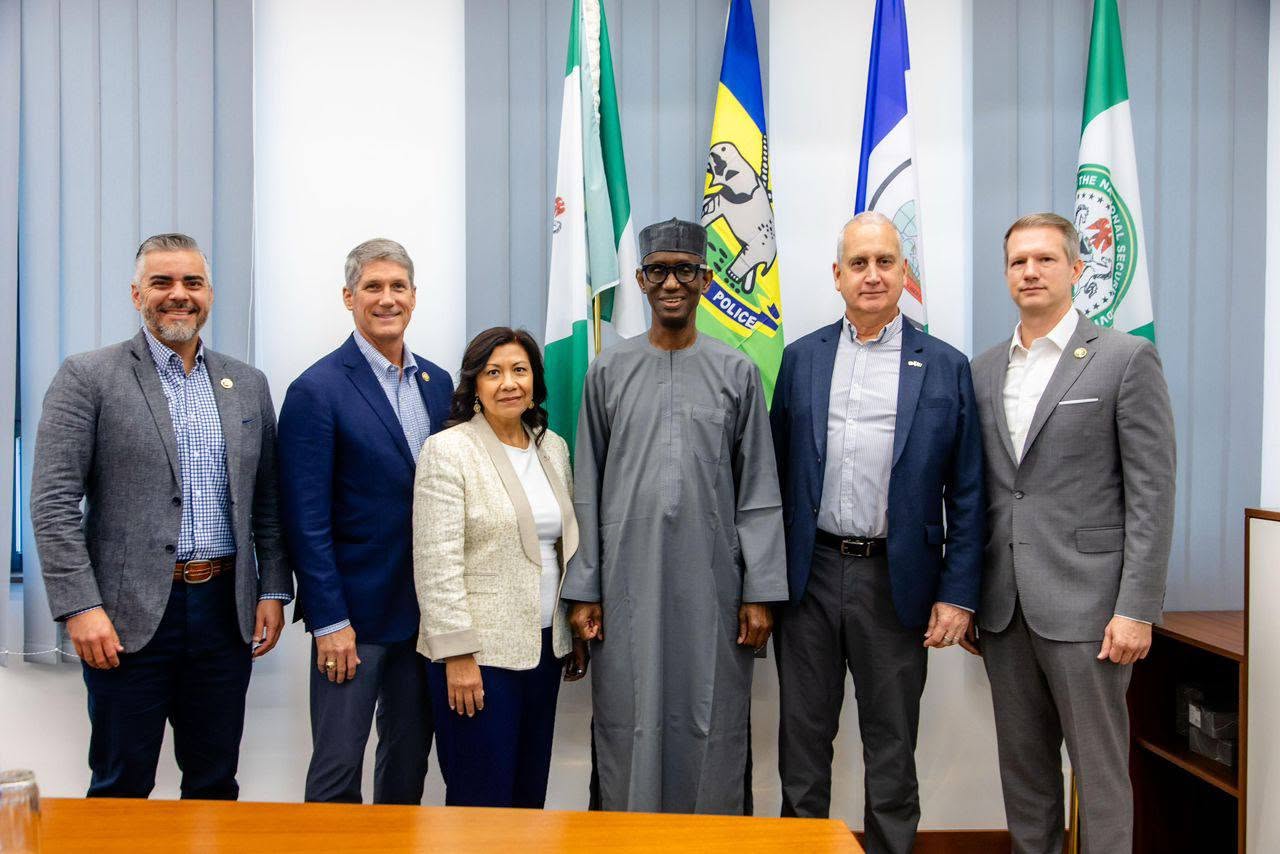
Security Concerns: Ribadu Hosts U.S. Congressional Delegation in Abuja
National Security Adviser Nuhu Ribadu on Sunday received a visiting delegation of the United States Congress in Abuja, as Nigeria and the U.S. continue high-level engagements on shared security priorities.
Ribadu, who shared details of the meeting on X, said the visit follows earlier discussions in Washington, D.C., focused on counter-terrorism cooperation and regional stability.
The delegation included U.S. lawmakers Mario Díaz-Balart, Norma Torres, Scott Franklin, Juan Ciscomani and Riley Moore, alongside U.S. Ambassador to Nigeria, Richard Mills.
He described the talks as constructive, noting that both sides explored ways to deepen strategic security collaboration.
“I’m optimistic this engagement will deepen trust, collaboration, and shared commitment to peace and security,” Ribadu said.
Congressman Riley Moore also described the visit as “very productive,” confirming that the delegation held wider engagements, including a stop in Benue State.
The meeting comes amid heightened diplomatic concern after U.S. President Donald Trump redesignated Nigeria as a Country of Particular Concern over alleged religious freedom violations, a move Nigeria has firmly rejected.
Nigeria has continued to seek stronger security partnerships with global allies.
Diaspora Watch recalls that on November 20, Ribadu met U.S. Secretary of War Pete Hegseth at the Pentagon, while President Bola Tinubu on November 27 approved Nigeria’s team for the U.S.-Nigeria Joint Working Group established during recent talks in Washington.

























